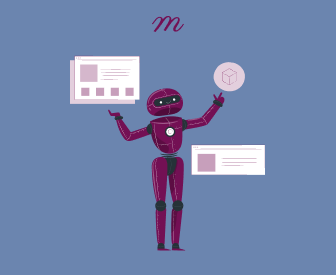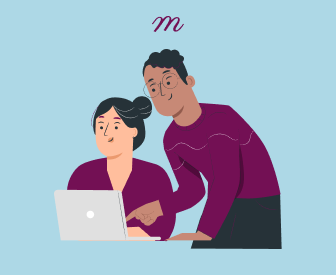Have your progress notes written for you automatically
Artificial Intelligence (AI) is transforming mental healthcare, offering innovative solutions to address the growing global demand for mental health support. From AI-driven chatbots providing therapeutic assistance to algorithms detecting early signs of mental health conditions, AI has the potential to revolutionize diagnosis, treatment, and accessibility. However, integrating AI into such a human-centered field raises important ethical and practical considerations. This guide explores the current applications, benefits, and challenges of AI in mental healthcare, highlighting how it can complement the work of professionals while preserving the essential human connection. Discover how AI is shaping the future of mental health care.
Why Does AI Matter for Mental Healthcare?
Diagnosing and treating mental health conditions is often a complex puzzle. Traditional methods rely heavily on self-reported symptoms and a professional’s observations. AI enhances this process by offering tools that complement the clinician’s expertise, delivering faster, more precise insights. It’s like giving mental health professionals a superpower—one that helps them better understand their clients and tailor treatments to their unique needs.
AI’s role in mental healthcare is about empowerment, not replacement. It’s a tool to assist therapists, psychologists, and psychiatrists in their critical work, ensuring that no detail is overlooked. Whether it’s through analyzing data, enhancing communication, or simply being available 24/7, AI is helping bridge gaps and make mental health support more accessible and effective.
In summary, it combines the best of technology and humanity. It’s not just a computer program—it’s a partner, a guide, and, in some ways, a translator of emotions. By harnessing its capabilities, we’re moving closer to a world where mental health care is smarter, faster, and more personal than ever before.
Applications of AI in Mental Healthcare
Let’s dive into some of the most exciting ways AI is making waves in mental healthcare, from making life easier for providers to giving clients better access and outcomes.
1. Automated Therapy Notes
Mental health professionals often spend countless hours on documentation—notes, treatment plans, and more. It’s vital work but can take time away from what really matters: client care. That’s where companies like yours come in, offering effortless automated notes powered by AI.
Picture this: after a session with a client, the AI reviews your input, organizes key details, and drafts progress notes or treatment plans. No more late nights staring at your computer trying to remember exactly what was said! This application streamlines your workflow, reduces burnout, and ensures that every detail is captured—accurately and efficiently. Providers can focus on being present for their clients while AI handles the heavy lifting.
2. Early Detection of Mental Health Issues
AI can be a powerful detective, picking up on the subtle clues that might otherwise go unnoticed. Machine learning models analyze vast amounts of data—text messages, voice patterns, wearable data, and more—to spot early signs of anxiety, depression, or even PTSD. For example, apps and platforms are using voice analysis to detect emotional distress or wearable devices to monitor changes in sleep and activity patterns that could signal a deeper issue.
This is a game-changer, especially in catching conditions early, when interventions can be most effective.
3. Virtual Therapy Assistants
Say hello to chatbots, your pocket-sized therapists. AI-powered conversational agents are becoming a key part of mental health support. These virtual assistants provide cognitive behavioral therapy (CBT), mindfulness exercises, and emotional support. They’re available 24/7, don’t require an appointment, and never run out of patience.
While they aren’t a replacement for human therapists, these tools are a fantastic complement. They’re especially helpful for individuals who need immediate support or those who may feel hesitant about seeking traditional therapy.
4. Personalized Treatment Plans
Mental health is not one-size-fits-all, and neither should the treatments be. AI excels at personalization by analyzing client data and recommending tailored interventions. Imagine an AI tool suggesting the perfect blend of therapy techniques based on a client’s unique history and needs. It’s like having a digital co-pilot guiding treatment decisions.
This personalization goes beyond just recommendations; it also allows for real-time adjustments based on how a client is responding to treatment. It’s care that evolves with the individual.
5. Administrative Superpowers for Providers
Therapists juggle many hats—counselor, note-taker, scheduler, and more. AI can take over some of these administrative tasks, making providers’ lives easier. From appointment reminders to billing assistance, AI tools streamline the behind-the-scenes work, leaving more time for meaningful client interactions.
6. Research and Insights
AI is like a magnifying glass for researchers, allowing them to sift through massive datasets and uncover trends that weren’t visible before. From studying population-wide mental health patterns to evaluating treatment outcomes, AI accelerates the pace of discovery. This means new therapies, improved techniques, and better overall care for clients.
7. Real-Time Monitoring
Wearables and smartphone apps equipped with AI provide continuous monitoring for clients, collecting data like heart rate, sleep cycles, and daily activity. For individuals managing chronic mental health conditions, this can provide a safety net, alerting caregivers or providers when something seems off. It’s like having a silent ally keeping an eye out for their well-being.
Why This Matters
AI isn’t here to replace mental health professionals—it’s here to elevate their work. From saving time on notes and treatment plans to providing clients with tools for ongoing support, the possibilities are endless. And while the technology is fascinating, what’s truly exciting is the impact: providers can work smarter, clients can access care more easily, and together we can tackle mental health challenges more effectively.
Whether you’re a provider looking for more balance in your day or a client seeking better care, AI is opening up a world of possibilities in mental healthcare—one breakthrough at a time.
Risks and Benefits of AI in Mental Healthcare
AI in mental healthcare has immense potential to transform how we diagnose, treat, and support mental health conditions. However, like any powerful tool, its use comes with both rewards and risks. To make the most of AI’s promise while safeguarding its use, we need to explore these two sides of the coin.
Benefits: Superpowers for Mental Healthcare
1. Greater Accessibility
AI-powered tools, like chatbots and mobile apps, break down barriers to mental healthcare. They provide support in areas where therapists are scarce, offer 24/7 availability, and are often more affordable than traditional therapy sessions. This can be a lifeline for underserved populations or individuals hesitant to seek help in person.
2. Enhanced Efficiency for Providers
Time-consuming tasks like documentation, scheduling, and treatment planning can be automated with AI, giving providers more time to focus on their clients. Tools can streamline workflows and reduce administrative burdens, helping therapists avoid burnout while improving the quality of care.
3. Early Detection and Prevention
AI excels at recognizing patterns that might go unnoticed by the human eye. For example, it can detect subtle signs of depression in a client’s speech or track behavioral changes via wearable devices. Early detection allows for timely intervention, potentially preventing more severe mental health crises.
4. Personalized Care
AI enables truly individualized treatment plans. By analyzing a client’s data—whether it’s past therapy outcomes, current symptoms, or even genetic predispositions—AI can recommend interventions that are most likely to be effective for that specific individual.
5. Research and Innovation
AI accelerates research by analyzing vast datasets, uncovering new trends, and identifying effective therapies. This means faster development of new treatments and greater insights into mental health conditions.
Risks: The Double-Edged Sword
1. Privacy and Data Security
Mental health data is deeply personal. While AI tools often require access to sensitive information, there’s always a risk of breaches or misuse. If improperly handled, this data could fall into the wrong hands or be exploited for unethical purposes, eroding trust in the technology.
2. Lack of Human Connection
AI may be efficient, but it can never replicate the empathetic connection of a human therapist. Over-reliance on AI could risk reducing mental healthcare to a purely clinical transaction, overlooking the importance of human warmth, understanding, and compassion in the healing process.
3. Bias in AI Models
They learn from data—but what if that data is biased? A machine learning model trained on incomplete or skewed datasets could perpetuate stereotypes or provide inequitable care. For example, it might be less accurate in diagnosing mental health conditions for certain demographics, leading to unequal outcomes.
4. Over-Reliance and Misuse
AI is a tool, not a replacement for professional judgment. However, there’s a risk that some might view it as a substitute for human expertise. This could lead to misdiagnoses, over-simplified treatment plans, or even harmful outcomes if the AI fails to consider complex human factors.
5. Ethical and Legal Challenges
Who’s accountable if an AI-powered tool makes a mistake? What happens when AI-based decisions conflict with a therapist’s expertise? These questions remain largely unresolved, posing challenges for both providers and developers in navigating the legal and ethical landscape.
The Balancing Act
To harness the benefits of AI while minimizing the risks, mental health professionals, developers, and policymakers must collaborate. This includes:
- Ethical Design: Ensuring AI systems are transparent, fair, and inclusive.
- Robust Data Protections: Prioritizing privacy and security to safeguard sensitive information.
- Complement, Not Replace: Using AI as a supportive tool that enhances, rather than replaces, the therapist-client relationship.
- Education and Oversight: Equipping providers with the skills to use AI responsibly and maintaining human oversight for all critical decisions.
Best Practices for Integrating AI in Clinical Settings
Integrating Artificial Intelligence (AI) into clinical mental health settings requires thoughtful consideration to ensure it enhances care rather than complicates it. Begin by identifying specific challenges that AI can address, such as reducing the administrative burden of documentation or improving the accuracy of treatment planning. Opt for tools that are evidence-based and rigorously tested, ensuring they align with the unique demands of mental health practice. Data privacy and security must remain a top priority; any AI system implemented should comply with strict regulations and maintain transparency about how sensitive client data is used.
Equally important is maintaining the human connection that lies at the heart of therapeutic work. AI should support clinicians by freeing up time for meaningful client interactions, not overshadow the empathy and understanding clients value. Providers should receive thorough training to understand the capabilities and limitations of AI tools, enabling them to use the technology confidently and ethically. Transparency with clients about how AI is integrated into their care can build trust and assure them that the therapeutic process remains human-led.
Starting small is often the wisest approach, introducing AI in a controlled, incremental manner and evaluating its effectiveness over time. Collaborating with developers who understand the nuances of mental healthcare can ensure that AI tools are designed with clinical realities in mind. Regular reassessment of AI’s role in the practice helps to refine its use, ensuring it continues to meet evolving needs while remaining in compliance with ethical and regulatory standards. By adopting AI thoughtfully and responsibly, clinicians can harness its potential to improve outcomes and streamline workflows while keeping humanity at the forefront of care.
Conclusion: The Future is Here, and It’s Personal
AI in mental healthcare isn’t just a technological trend—it’s a revolution in how we understand, deliver, and experience mental health support. From streamlining documentation to detecting early warning signs, AI empowers clinicians to focus on what matters most: building meaningful connections and guiding clients toward healing.
But AI’s real magic lies in its potential to personalize care like never before. By tailoring treatments to individual needs, offering 24/7 support through chatbots, and breaking down barriers for underserved communities, AI is making mental healthcare smarter, more accessible, and profoundly human. It’s not about replacing the warmth of a therapist’s empathy but amplifying their ability to reach and support more people effectively.
Of course, with great potential comes responsibility. Thoughtful integration, transparency, and ethical use are critical to ensuring AI serves as a partner—not a replacement—in the therapeutic process. When embraced responsibly, AI can enhance care without compromising trust, empathy, or the human touch.
As therapists, psychologists, and mental health professionals, you are at the forefront of this transformation. AI is your ally, designed to lighten your workload, sharpen your insights, and expand your reach. Together, humans and technology can create a future where mental healthcare is more effective, compassionate, and inclusive than ever before.
The future is here. Are you ready to embrace it?








